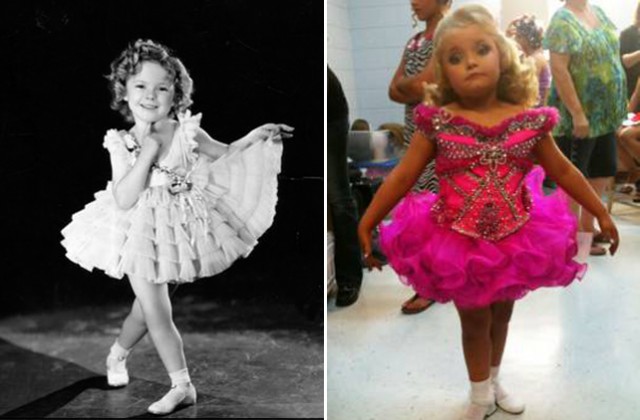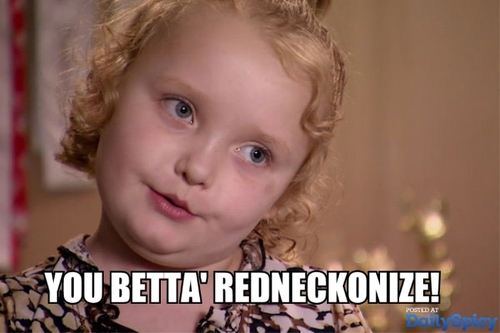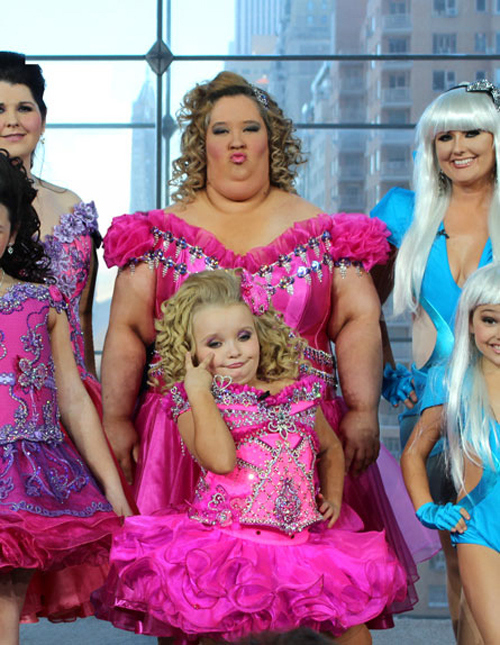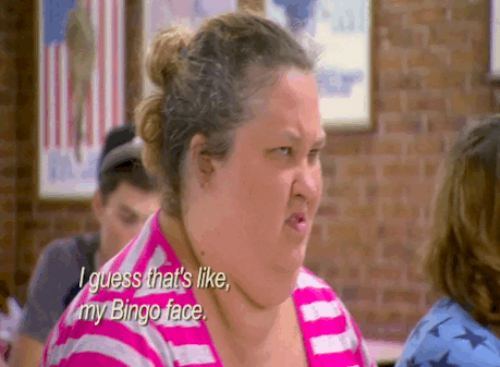Here Comes Honey Boo Boo and the Spectacle of the Ungovernable Child
Kristen Hatch / University of California, Irvine

Reality television’s first full-fledged child star has been likened to Shirley Temple, if only to bemoan the differences between the most popular girl of the Great Depression and the most talked-about girl of the Great Recession. An internet meme has emerged whereby bloggers pair photos of Temple with images of Honey Boo Boo (aka Alana Thompson) to highlight Temple’s cuteness and Alana’s freakishness. Alana, whose conversation is punctuated by farts and snotty sneezes, could hardly be more different from Temple.
Golden ringlets aside, Alana Thompson is more similar to another representative of girlhood, Topsy, the incorrigible slave child of minstrelsy. Topsy originated in the pages of Harriet Beecher Stowe’s Uncle Tom’s Cabin, but during the late nineteenth and early twentieth centuries she evolved into one of the most popular characters on the minstrel stage. Like Honey Boo Boo, Topsy was an ungovernable child who invited laughter rather than the caresses commonly elicited by the “cute” little girls of stage and screen. Topsy’s signature tune, “I’s so wicked,” was an up-tempo song in which the slave child described the lengths to which her former mistress went to tame her:
She used to knock me on de floor,
den bang my head agin de door
and tare my hair out by de core,
O! cause I was so wicked!
In Stowe’s novel, Aunt Ophelia successfully reformed Topsy into a good Christian through the administration of loving discipline. However, on the minstrel stage Topsy remained delightfully unreformed.
Indeed, reality television bears some striking resemblances to blackface minstrelsy. I don’t mean to minimize the violence of racial slavery and Jim Crow or to obscure the specificity of blackface. However, a brief comparison of these two forms of entertainment might shed some light on how Here Comes Honey Boo Boo functions within the context of twenty-first century capitalism, particularly insofar as it helps to obscure the violence endured by the subjects it mocks, in this case the violence of poverty.
Minstrelsy, like reality TV, created the illusion that what audiences saw on stage was an authentic representation of African American speech, song, and dance. Before the age of mechanical reproduction, mimicry functioned as a means of reproducing actions across time and space. Similarly, television audiences often forget that the subjects we see on reality shows aren’t the genuine article but facsimiles mediated by recording technology, their behaviors shaped by the prompting of the producers, by editing, and by cinematography and mise-en-scene. This mistaking of the copy for the real thing serves a similar function in both cases, helping audiences to imagine that what they see is not a projection of a society’s pathology but the genuine article.

Also like minstrelsy, reality television is built on contradictory responses to its subjects. In Love and Theft, Eric Lott has demonstrated the ways in which antebellum minstrelsy was shaped as much by an anxious desire for blacks as it was an expression of violence toward them.1 Likewise, Here Comes Honey Boo Boo solicits both admiration for and derision of its redneck subjects. While the stereotyped black man has come to signify suffering,2 stereotyped rednecks often function as shorthand for rebelliousness against the restrictive norms of modern capitalism.
Here Comes Honey Boo Boo invites audiences to respond with both admiration for Alana’s family, particularly her mother, Mama June, and with disgust at their behaviors. The show offers an opportunity to celebrate the family’s rebellion against neoliberal capitalism even as it invites audiences to criticize Mama June for her failures as a neoliberal subject. Indeed, Laurie Oullette’s work has established neoliberal critique as an important framework for understanding reality TV.3 For the show’s detractors, Mama June is emblematic of the bad citizen: irresponsible, undisciplined, and complacent. She had her first child at the age of 15, each of her four daughters was fathered by a different man, and she lives on welfare and child support payments. Her corpulence is taken as a sign of her inability to properly care for her own body, let alone for her children. And she lives on the philosophy “it is what it is,” accepting her circumstances rather than working to overcome them as a good neoliberal citizen would.
In contrast, June’s supporters point to the love the family members exhibit toward one another and the fun they all seem to have playing games like “Guess Whose Breath.” Much of the pleasure of Here Comes Honey Boo Boo is derived from witnessing the family’s excesses and their unwillingness to embrace middle-class behaviors or succumb to the dictates of neoliberal citizenship. June has been celebrated for encouraging her daughters to reject an ideal of feminine beauty that would require them to lose weight (“Beauty comes in all sizes”), and self-improvement projects are subject to mockery. For instance, when a woman is brought in to coach Alana on proper etiquette, the etiquette coach is subjected to the girls’ nose blowing and belching. Rather than berate her children for their failure to take these lessons in middle-class deportment seriously, June says into the camera, “She [the etiquette coach] is what we call a square, and we’re . . . like a deformed shape.”

Whether one responds to Honey Boo Boo, Mama June, and their family with admiration or disgust, however, this focus on their personal behavior helps to obscure the larger problem that the show inadvertently exposes: the failures of neoliberal policy, and the violence it enacts on America’s poor. Like a host of other reality shows, Here Comes Honey Boo Boo makes a spectacle of the family’s poverty, encouraging us to respond to their eating habits, for instance, with revulsion. June’s sauce for the children’s favorite meal, “sketti,” consists of a tub of Country Crock butter and several squirts of ketchup heated in the microwave; the family eats generic cheese puffs for breakfast; and Alana is overjoyed by the prospect of “road kill” for dinner.
The show suggests that life below the poverty line isn’t all that bad as long as it’s filled with love. Nonetheless, while June’s resignation to her poverty is celebrated as self acceptance, it’s clear that the family’s health is suffering from poor nutrition, and that their poor nutrition is a result of poverty. June is proud of her ability to feed a family of six on $80 a week (that’s roughly 63 cents a meal, assuming each family member eats three meals a day). And she attributes her aversion to mayonnaise to the fact that she was given mayonnaise sandwiches for breakfast, lunch, and dinner as a child.
When we step out of the framework of discussing Honey Boo Boo’s family in terms of their success or failures as neoliberal citizens, however, Here Comes Honey Boo Boo becomes an object lesson in the correlation between poverty, obesity, and diabetes. The family jokes about what they term June’s “forklift foot,” which was injured by a forklift when she was working in a warehouse. June is loath to show the injury to her family let alone the camera. When she finally does reveal it, the foot doesn’t appear to be badly injured until one notices the bugs flying around it and her children exclaim that it smells bad. Following the lead of June’s daughters, the show frames her foot as an occasion to squeal in disgust, though some viewers have taken the revelation as an opportunity to voice their disapproval of June for not properly regulating her body. Likewise, June’s “bingo face” (her squinting to see the numbers at a bingo game) and her “neck crust” are subjected to the same ridicule, though both are signs of poor nutrition or untreated medical conditions. While the show was on hiatus, Alana’s father, Sugar Bear, was rushed to the emergency room, where doctors diagnosed him with pancreatitis and diabetes.

Perhaps this is where Here Comes Honey Boo Boo is most like minstrelsy. At a moment when 22% of American children live below the poverty line, a number that is increasing as programs for childhood education and nutrition dwindle, the show invites us to laugh at and with Honey Boo Boo and her family, foreclosing conversation about how policies shaped by neoliberal capitalism have failed them. Like the slave child Topsy, Honey Boo Boo allows us to reimagine the violence enacted on a class of people as a source of fun.
Image Credits:
1. Shirley Temple and Alana Thompson
2. Alana Thompson, The Star of Here Comes Honey Boo Boo
3. “Mama” June Shannon and Alana Thompson
4. June Shannon’s “Bingo Face”
Please feel free to comment.
- Eric Lott, Love and Theft: Blackface Minstrelsy and the American Working Class (New York: Oxford UP, 1993). [↩]
- Linda Williams, Playing the Race Card: Melodramas of Black and White from Uncle Tom to OJ Simpson. (Princeton UP, 2002). [↩]
- Laurie Ouellette, “Take Responsibility for Yourself: Judge Judy and the Neoliberal Citizen” in Susan Murray and Laurie Ouellette, eds. Reality TV: Remaking Television Culture (New York: NYU Press, 2004): 231-250. [↩]
Kiristen; great stuff! I was thinking along these lines, in terms of a contemporary inflection for my research on Shirley Temple ‘double’ competitions in New Zealand in the 1930s. My trip to the US last month filled some gaps and it is great to make contact with you whilst I was there. One narrative track I am following is the court case brought against Graham Greene and the publishers of ‘Night & Day’, for his scathing review of ‘Wee Willie Winkie’ and the general meaning of Shirley.
I will keep in touch. I have another interview lined up with an elderly lady who was involved in the 1935 competition in Christchurch, NZ. It is certainly a multi-layered story!
Hearing the names Honey Boo Boo and Shirley Temple uttered in the same sentence, let alone compared, could be considered by some to be sacrilege. I do agree that Here Comes Honey Boo Boo is a modern day form of Topsy’s minstrelsy – poking fun at an underprivileged and under-recognized group of people. However, I do have some minor issues with the comparison. The humor from the Topsy minstrel shows seemed to come from white people’s opinions of African Americans, something the African Americans themselves had no control over. Honey Boo Boo and her family may, sadly, be below the poverty line, but such poverty loses its believability when one actually watches the show. For one thing, they are on a wildly successful and talked about television show, which would have to rake in some amount of money for the family. Secondly, the family gained notoriety on Toddlers and Tiaras, another TLC show, in which thousands of dollars are spent on children competing in beauty pageants. This takes away some of the family’s credibility as underprivileged Americans and makes it seem as if all the stunts are for show. It is also important to point out that reality television has become an outlet for viewers to watch and feel better about themselves; reality TV stars are people we love to hate. It is likely that Honey Boo Boo’s popularity is linked to this, rather than allowing the show to be a discussion on class in America.
Great article, however I tend to agree with Lindsay Walker on the absurdity of placing Alana in the same sentence as Shirley Temple. The discussion on the credibility of the show as “real life” or reality t.v. is what interested me the most. Once one realizes that the family cannot possibly be living in the manner that is depicted on the show given their success, one must also come to the concluion that “Here Comes Honey Boo Boo” is aired to entertain and not inform. Given the success of the show I would say the producers have attained their goal. Just as with all media projects, “Here Comes Honey Boo Boo” will be liked by some segment of the population and disliked by others. The trick is to get enough of the population to like the show that production becomes a financial success.